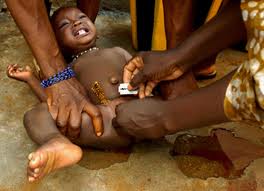UNICEF report reveals Female Genital Mutilation (FGM) still prevalent in Ghana
- Posted on
- Comment
 A new study by United Nations Children’s Fund (UNICEF) has revealed widespread practice of female genital mutilation (FGM) in Ghana and other countries in Africa, Middle Eastern and Asian communities.
A new study by United Nations Children’s Fund (UNICEF) has revealed widespread practice of female genital mutilation (FGM) in Ghana and other countries in Africa, Middle Eastern and Asian communities.
The survey, described as the most comprehensive to date on FGM, however, found that support for the practice was declining amongst both men and women in Africa, Middle East and Asian countries.
Even though majority of people oppose female genital mutilation in the countries where it is practised, more than 125 million girls and women have been subjected to FGM and 30 million more are at risk over the next decade.
But UNICEF has urged an end to the practice.
Although Ghana is named among the countries where there has been a positive decline in the harmful practice with a national average of about 4% of Ghanaian girls and women undergoing FGM, it still translates into several hundred thousand women and girls, according to the report.
The Upper West Region and other arrears were cited as areas with the highest prevalence with more than 16% of girls who have had their clitoris cut.
The report says legislation alone is not enough and recommends subjecting the practice to greater public scrutiny so that entrenched social attitudes to it can be challenged.
Female genital mutilation (FGM), also known as female genital cutting (FGC) and female circumcision (FC), is defined by the World Health Organisation (WHO) as “all procedures that involve partial or total removal of the external female genitalia, or other injury to the female genital organs for non-medical reasons.”
| JOYONLINE |








 (Selorm) |
(Selorm) |  (Nana Kwesi)
(Nana Kwesi)